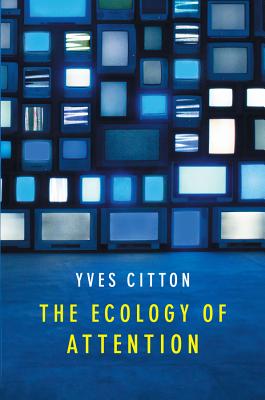
The Ecology of Attention (2017) Yves Citton
The book analyses the concept of attention and its absorption and commodification into the digital economy. Citton argues that over the past 30 years there has been an acceleration away from the economy of the ‘product’ toward the capturing and managing of attention. This economy of attention has been amplified through our everyday technologies that bombard and seduce us in a variety of different ways. “Attention is the crucial resource of our epoch.” (Citton, 10) Although never replacing the material economy this capturing of attention reifies the market economy whilst at the same making us more vulnerable to it.
Usefully Citton traces his analysis of the emergence of the attention economy right back to the emergence of aesthetics as a field of discourse. Aesthetics and art history continually debate the merits and value of sensory and visual experience. Therefore it is in a sense dealing with forms of sensory attention that have influence in emergence of capitalist models of production and the advertising and design of consumer products.
Citton structures the book in three sections. The first, on collective attention, he looks at the co-constitutive modes of attention that rely not merely on the individual subject but are necessary to any perception of the world. In other words, our individual modes of attention are structured by ‘transindividual flows’ that establish collective ‘attentional regimes’. This includes for example our current technological landscape which heavily shapes and mediates our attentional attitudes. The ‘media sphere’ becomes an “ECHOSYSTEM, understood as an infrastructure of resonances conditioning our attention to what circulates around, through and within us.” (Citton, 29) What Citton is proposing as an ecology of attention that is critically able to reflect on forms of collective attention.
The second section interrogates notion of ‘joint attention’ that look more intimately at the biological and social spaces that configure and inform our social relations. Citton argues that shared spaces and relations ultimately require the ability to detach to allow modes of ‘joint’ (instead of ‘joined’) attention to emerge. In this section Citton promotes attention as a mode of care. It is through a mode of joint attention that care emerges and flourishes. Citton 1explicitly links care and ecology through the interpersonal space of joint attention. This is the space that some feminist critics have already demarcated. Is as Citton notes a ‘relational concern’ whereby “the quality of our existence depends on our c sideration of the quality of the relations that simultaneously weave our environment and our being.” (Citton, 113) This is where an ethics of care emerges from. Such an ethics invokes forms of attentive listening, pluralism and an advance of trust that is coincident with feminist and intersectional movements that insist on modes of care and attention that area from of micro-politics that productive of new political thinking.
The third section focuses on attention as an active process that is not merely subsumed by modes of collective and joint attention. Citton argues for an ‘aesthetic’ sensibility that cultivates an awareness of what we are asked to pay attention too. In other words, to form a critical form of attention. This notion of ‘reflexive attention’ understood in an aesthetic and critical sense offers an interesting frame to conceive of notions of an aesthetics of care, emerging out of a critical mode of attention. “I give my attention to what I value and I value what I give my attention to.” (Citton, 139)
Citton conjures up a notion of ‘Aesthetic Laboratories’ that leans into Ranciere’s notion of the distribution of the sensible that produce potential experiences that break with the everyday onslaught of distractions and noise. Despite its scientific resonances Citton understands such labs as also artistic in nature, a place of experimentation, creativity, and critical reflection. Or as he denotes spaces of experimentation, labour, and oddly prayer.
The book is an interesting philosophical reflection on the politics of attention and its broader ramifications on technology and society. It also mobilises key elements of aesthetics, care and ecology that align specifically with the remit AoC.
Mick O’Hara
TU Dublin
Citton, Yves. The Ecology of Attention. Cambridge: Polity Press, 2017.
